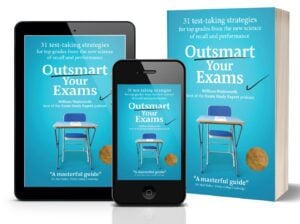Is AP World History easy or hard? We reveal the AP World History difficulty rating, based on a unique combination of 2023 pass rate data, and 3,160 class reviews from real AP alumnae collected by r/APStudents.
Is AP World History Easy Or Hard?
AP World History is considered quite hard, with class alumnae rating it 6.0/10 for overall difficulty (the 10th-most-difficult out of the 28 large AP classes surveyed).
The pass rate is about average vs other AP classes, with 65% graduating with a 3 or higher.
AP World History is very widely-taken (356,000 entries last year), and 93% would recommend the class.
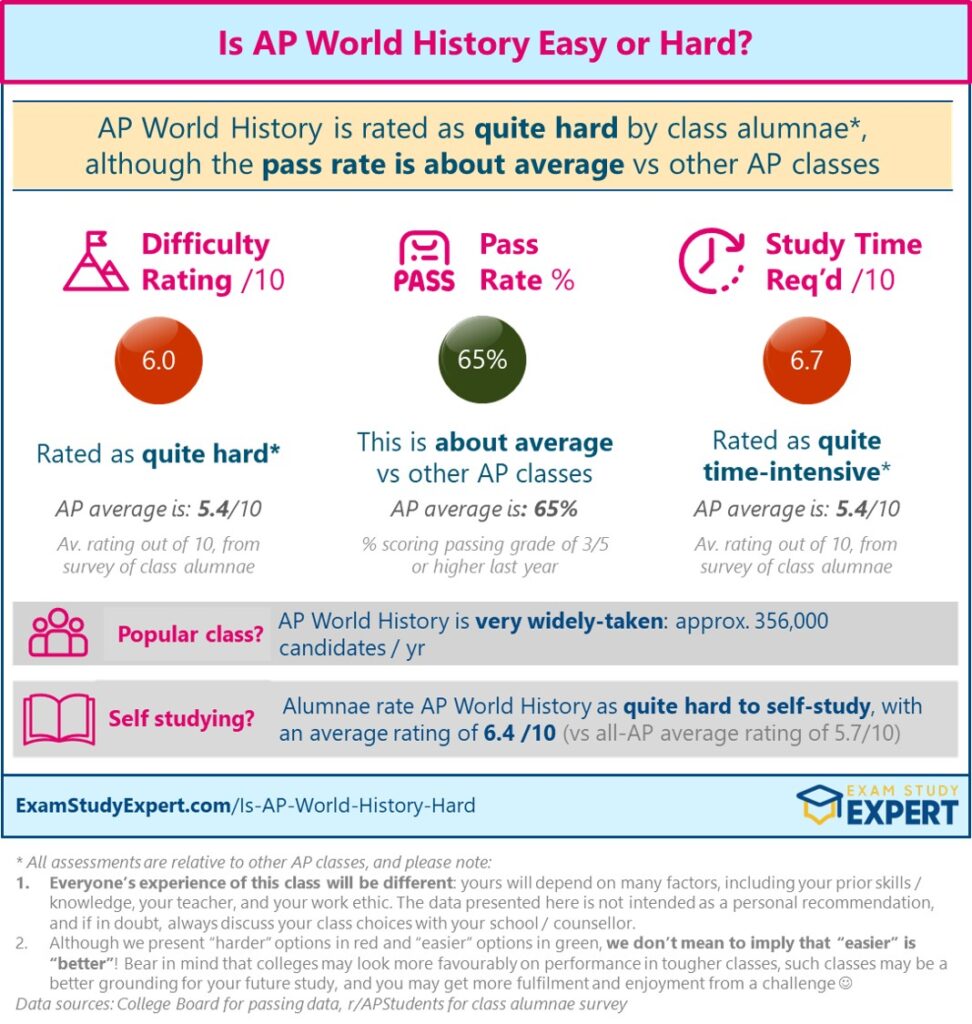
Whilst AP World is rated as quite hard, alumnae reviewers enjoyed the course, and found it manageable if they prepared consistently, practiced for the exam, and focused on the broader trends in world history rather than the specific details.
You can see how AP World compares to other classes for difficulty in the below chart:
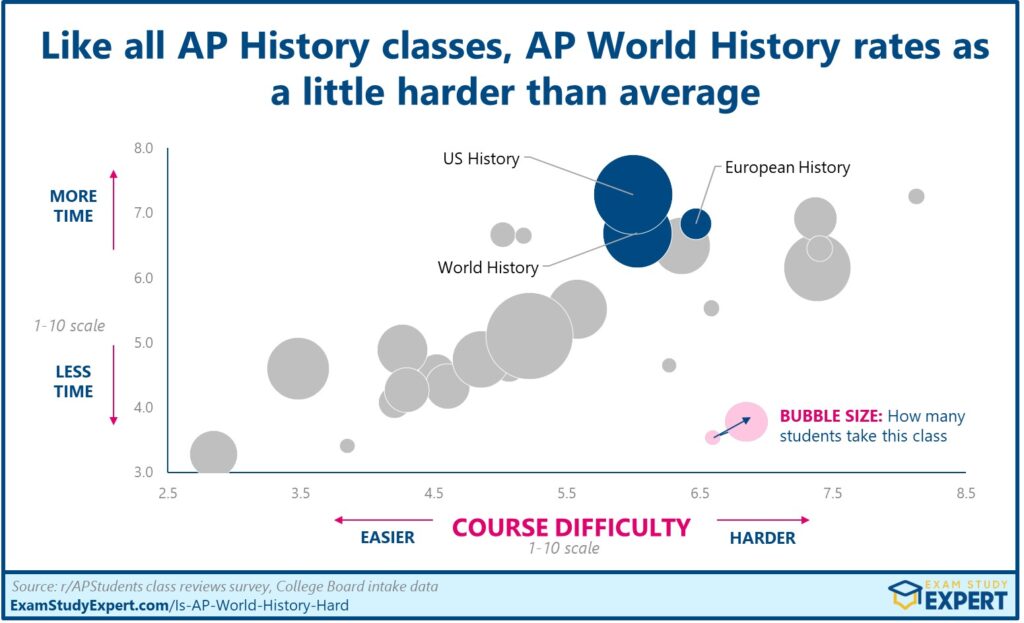
We’ve highlighted AP World History and related history classes (US History and European History) only – to see the full version of this chart, check out our article ranking ALL the AP classes from easy to hard.
You can read more about AP US History (APUSH) and AP European History here.
How Difficult Is AP World History – As Rated By Class Alumnae
AP World is considered quite hard, with class alumnae rating it 6.0/10 for overall difficulty, making it the 10th-most-difficult out of the 28 large AP classes surveyed.
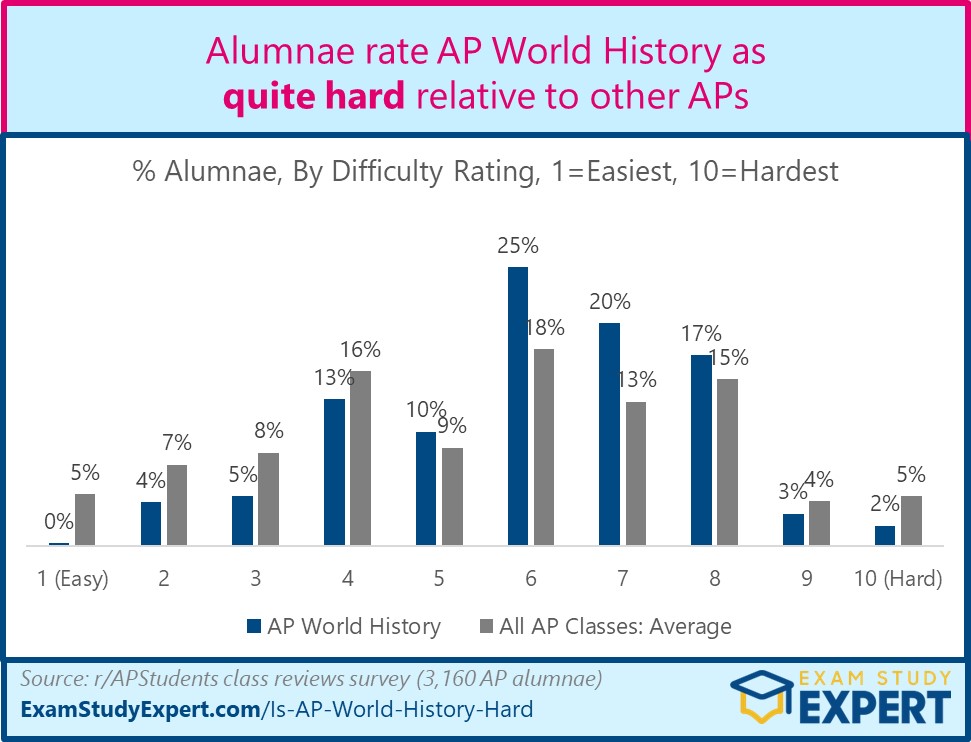
What Is the AP World History Pass Rate 2023?
The AP World History 2023 pass rate was about average, at 65%.
The largest percentage of candidates (28%) received a 3. The percentage of candidates awarded a 4 was about average at 22%, and 15% of candidates attained a 5.
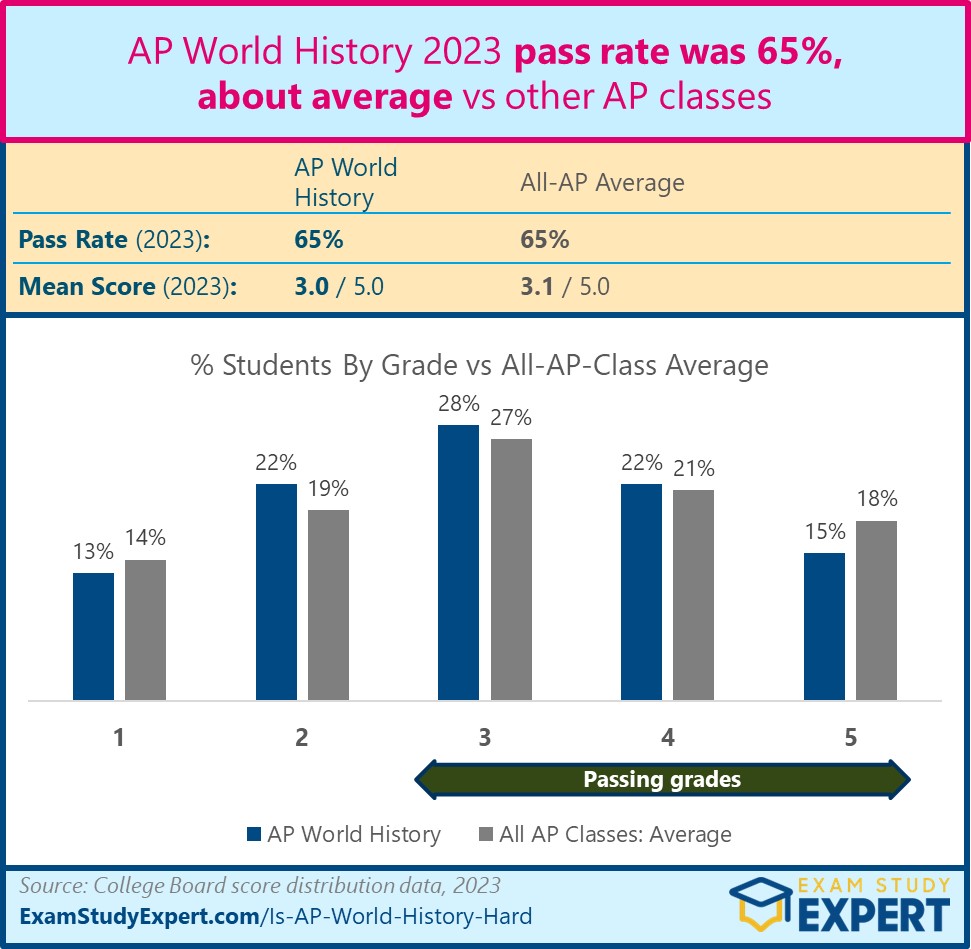
AP World Pass Rate / Score Distribution Over Time: 2023, 2022, 2021 …
The AP World History score distribution has varied somewhat over the past 5 years of exams. Although 2021 saw a dip in the pass rate of 8%, 2022 and 2023 saw the pass rate rise again to its highest levels in the past 5 years.
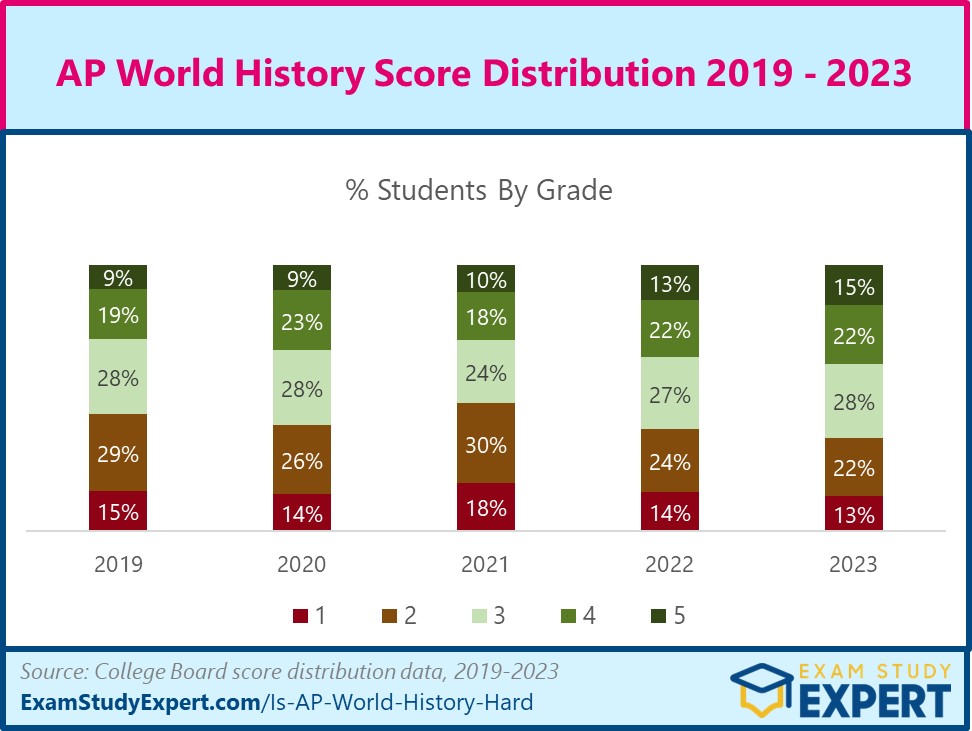
Is AP World History Time Consuming To Study: As Rated By Alumnae
AP World History is rated as quite time-intensive relative to other AP classes.
A survey of AP alumnae asked for a rating out of 10 for time needed to study each class, with 1 = least time needed, 10 = most time. The average rating for AP World History was 6.7/10 (vs the average across all AP classes of 5.4/10).
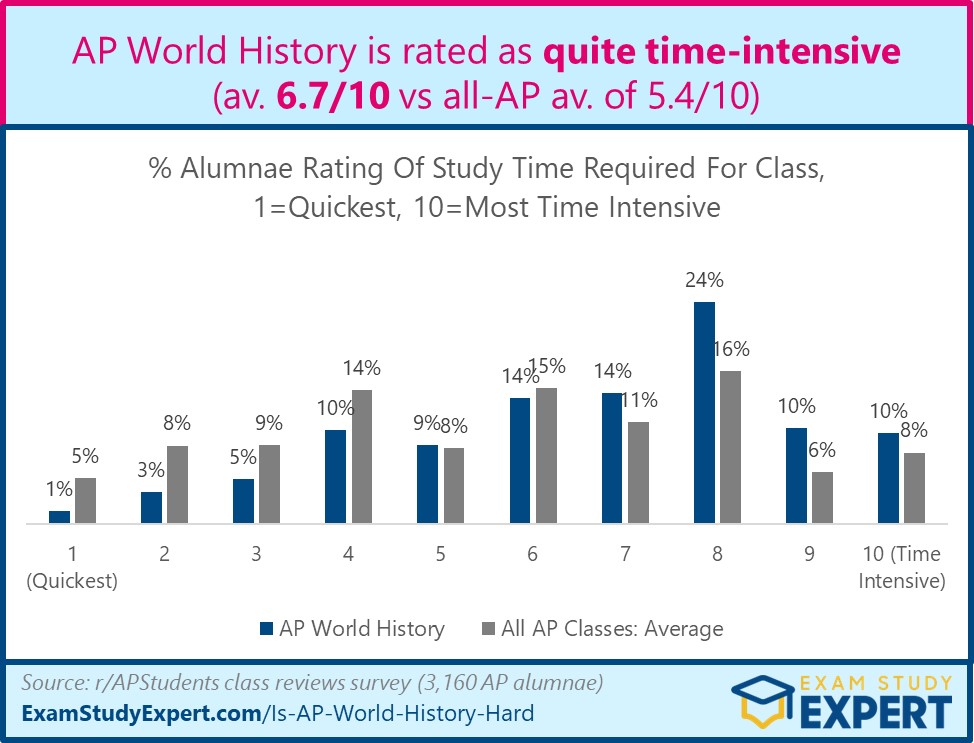
Is AP World Easy or Hard To Self-Study
AP World History is rated as quite hard to self-study relative to other AP classes.
A survey of AP alumnae asked for a rating out of 10 for how easy each class is to self study, with 1 = easiest to self study, 10 = hardest to self study. The average rating for AP World History was 6.4/10 (vs the average across all AP classes of 5.7/10).
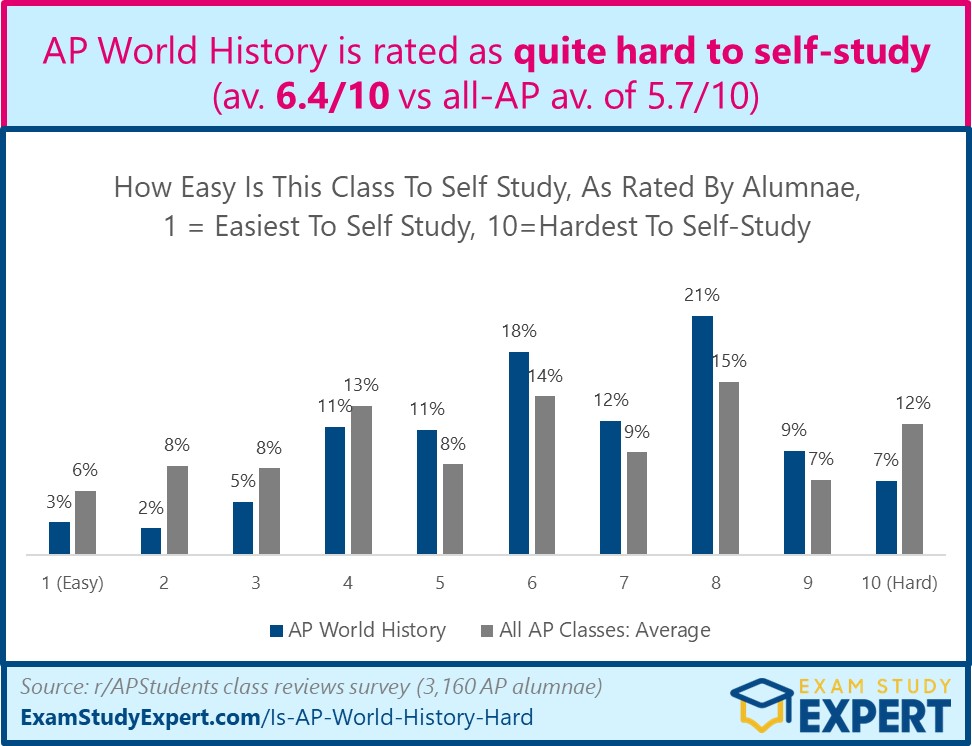
How Hard Is AP World History: 289 Real Alumnae Share Their Experiences
If you’re looking forward to taking AP World History, it’s important to take both the positive and negative feedback in context. There are multiple factors that could contribute to a great or poor experience of the class, such as a particularly weak teacher and your personal preferences as a learner.
An impressive 93% of AP World History alumnae would recommend the class.
The majority of the reviews focus on course experience, the importance of overall concepts and trends, the need for steady preparation throughout the year, and helpful study methods.
1. The course is hard work …
“Even if you don’t plan on doing anything related to history, taking AP World History, one of the hardest AP classes, proves your potential as a student.” – Score: 4
“’It’s only hard because of the amount of content. With history classes, always try to remember what’s going on at the same time as whatever you’re focusing on. There’s a lot going on at once.” – Score: 5
“’If you enjoy history, it is very fun and interesting, but still requires a good amount of work. The hardest part, I would say, is writing DBQs and all the short answer questions (time management). If you have that down to a science, then you will succeed! … Also, it is very important that you get the general gist of things, you do not always have to know micro-details, like understand the patterns of history. Make sure you comprehend history, like understand why things happened (not just that they happened in time). Good luck!!” – Score: 5
2. … but enjoyable
“Overall super fun and interesting course if you love history and pay attention in the class(unlike me) and you’ll get a 5!’ – Score: 2
“This is an absolutely amazing course! As long as you stay focused and keep up with the workload a 5 is very achievable. Make sure you know your writing rubrics inside out and practice writing essays often.” – Score: 5
“Extremely fun class! The hardest thing was China and its dynasties, but everything else will probably stick if you’re interested in it.” – Score: 5
“One of the best classes I have ever taken. If you have a good teacher, you can learn useful stuff that will benefit you in the long run.” – Score: 5
“It’s a lot of hard work if you’re not naturally talented. Although, it is rewarding to get done with it, and you do learn a lot by analyzing sources and writing in the form. I’ve become a better SAT reader and essay writer through this course. If you’re just doing AP’s for college credit I don’t recommend it because it doesn’t give much valuable college credit.” – Score: 4
3. AP World History is all about understanding the big picture trends
“Recognize common trends between civilizations, being able to make connections is helpful for DBQ’s and FRQ’s. Make sure to understand WHY things happened, and WHEN they did.” – Score: 4
“There’s a lot of information to cover, but just knowing the general trends should be enough for the AP exam. Memorizing vocab words for each era will help you with concrete details for the essay” – Score: 5
“Remember the trade routes and learn continuity and causation! Analyzing DBQ’s in 15 minutes is necessary to make sure you have enough time to write them. Don’t sweat the small details! Make sure to connect events together and figure out how they flow.” – Score: 3
“My teacher really emphasized the point that this course is all about broad events and movements and not necessarily focusing on the specific, which is really good advice that if you can take, can really change how you study for the exam.” – Score: 4
“Don’t stress about remembering everything, just the general trends over time. Be really, really familiar with the scoring rubric for all of the essays and use it to help you choose which essays/parts of an essay to write first.” – Score: 4
“Pay attention in class and have a general timeline of when things happened. Specific dates rarely matter … Having an argument and bringing up a counterpoint to that argument will get you points on a DBQ too, so don’t be afraid to do that.” – Score: 5
“The class relies heavily on understanding the big picture of history and being able to make connections across many different events. It’s not as detail oriented as APUSH so I find that makes it significantly more manageable.” – Score: 4
3. Knowing the exam format is really important
“The essays are what test your understanding of a topic. … EVERY multiple choice refers to either a short paragraph or a photo. Most photos have a caption or title that shows the time period, so be sure to read those too.” – Score: 4
“Most students taking APWH are unfamiliar with the AP writing style, and that, coupled with the huge timespan of the course, makes it seem really overwhelming.” – Score: 5
“Because of the way that the MCQs are formatted, material knowledge is not as important as in previous years. Its greatest importance is found in the LEQ and SAQs, and thus, when learning material, you should focus primarily on the abstract importance … rather than superficial information.” – Score: 5
“For future testers, I would recommend having a general knowledge of what happens in each periodization and looking at student samples and rubrics of the essays.” – Score: 5
“Learn the format of the essays and practice time management on the multiple choice questions. Don’t get too bogged down in details.” – Score: 5
“If this is the student’s first History AP, they should familiarize themselves with Stimulus-Based Multiple Choice Questions and the formats of the Free-Response Questions and Essays.” – Score: 4”
“Do good on the DBQ, it is worth so much. For the multiple choice, keep practicing throughout the year because the questions are tough and take a lot of thinking.” – Score: 4
“Be able to read from a stimulus, because all of the MC is based on that. Essays are relatively easy if you know what you’re doing, and that’s probably how I got a 3 instead of a 2.” – Score: 3
4. If you want to self-study, start early!
“If you are thinking of self studying this test, you should start way early because unlike us history this course has a lot of content that you need to know especially if you want to do well on the dbq and the saq.” – Score: 2
“Would be hard to self study due to FRQ, but very much able to do. Having a class makes a good advantage.” – Score: 4
“’Self studying might be hard due to lack of instruction for dbqs and leqs. teachers are helpful for helping you on these essay questions” – Score: 5
What Does It Take To Succeed: How To Study For The AP World History Exam
What is AP World History? Course Outline & Requirements
According to College Board:
“In AP World History: Modern, students investigate significant events, individuals, developments, and processes from 1200 to the present. Students develop and use the same skills and methods employed by historians.”
There are no prerequisites for AP World. Students are expected to read college-level textbooks.
You will develop skills in:
- Identifying and explaining historical concepts, sources and situations
- Comparing and explaining primary and secondary source evidence and arguments
- Contextualizing and making connections between historical developments and processes
- Constructing, corroborating and supporting evidence-based historical arguments
- Using reasoning about comparison, causation, continuity and change
The exam consists of one 3 hour 15 minute exam, in three sections. Section 1 consists of 40% (55 minutes) of multiple-choice questions (MCQs); Section 2 is 20% (40 minutes) with 3 short answer questions; and Section 3 is 40% (1 hour 40 minutes) for 2 free-response questions: 25% document-based (DBQs) and 15% long essay (LEQs).
For more details, see: College Board’s AP World History course page.
Examiners’ Reviews: Takeaways From AP World History Test Assessors
Multiple-choice section
- “As usual, students scored significantly higher on the multiple-choice section than on the free-response questions.”
- “AP World History students scored fairly consistently across all units, with somewhat higher performance on Units 1–4 (c. 1200–c. 1750) than on Units 5–6 (c. 1750–c. 1900). Performance on Unit 7–8 (c. 1900–present) was slightly stronger than on Units 5–6.”
- “AP World History students’ strongest skill in the multiple-choice section was Skill 3, Contextualization. 17% of students answered virtually every such question correctly.”
- “The most challenging skill for students in the multiple-choice section was Skill 5: Making Connections, which involves identifying patterns of causation, continuity, and change. Students performed slightly stronger on questions about causation than on questions about continuity/ change.”
Free-response section
- “The highest performance in the free-response section was on Short Answer Question 2, in which students analyzed continuities and changes within gender roles in the late 19th century. 18% of students earned perfect scores for their responses to this question.”
- “The lowest performance within this year’s AP World History Exam was on Short Answer Question 4, continuity and change in South or Southeast Asia in the period 1750–1900. Only 22% of students chose this question option, but of those who did, 14% earned perfect scores on it and 40% received 0 points.”
For best results, you may therefore want to consider investing a little extra study time on Units 5–6 (c. 1750–c. 1900), Skill 5 (“Making Connections”), and South(east) Asia in the period 1750–1900.
For more details, see: College Board’s AP World History 2021 exam results page.
How To (Self) Study AP World: Advice From Class Alumnae
Regular practice is the key to success
“Do your readings on time! try doing practice writing prompts once a month and learn how to analyze documents. time management is essential to succeed in this course.” – Score: 4
“Don’t fall behind on material. Make sure to practice lots of SAQ, DBQ, LEQs and be familiar with the broad range of world history.” – Score: 5
“Don’t procrastinate. Trust me. Study well in advance and do it a little bit each day” – Score: 4
“Write as many SAQs DBQs and LEQs as you can. You have to practice the format of the test.” – Score: 5
“Go over actual stimulus questions from the AP Exam–they will help you much more than just basic vocab (although, that is incredibly important). Understand how history can connect with each other and how it intertwines through all the periods.” – Score: 3
“Do several practice SAQ’s, LEQ’s, and DBQ’s throughout the year. Hopefully your teacher will give out tests that include some of them during the course, but if they don’t, make sure you practice them regularly (especially towards the end of the year). Many kids who were in my class and other classes did not know how to structure their free response questions when it came to the actual exam and had, inevitably, no effective time management (this hurt them a lot, as FRQ’s are 60% of the exam score).” – Score: 5
Develop some useful study methods that work for you
“Make a cheat sheet with the most important people, events, and ideas for every time period. Also, if you are using AMSCO and/or Bentley, read the pages with summaries – they provide really good context that you can later use in a DBQ or an LEQ.” – Score: 5
“Read the chapters and go through the vocab. I started improving when my friends quizzed each other at lunch.” – Score: 5
“Don’t do what I did and wing it! Make sure you study and go back on what you learned. If your teacher allows it, try to make Kahoots or Quizlets for others in your class so you can all learn.” – Score: 3
“Making a brain map as you chronologically study the course. By this I mean taking the key concepts (as per CB) and events and dates and people and tying them in together. Know how to grt points for FRQs. Take practice tests, 2016 and if possible 2017” – Score: 4
“Definitely use a review book, and as you go through the year, find a way to organise or summarise what you learn. APWH is a lot of content and you definitely need to summarise it and miniaturise it to memorise the whole textbook for the exam.” – Score: 5
“Talking about the material in study groups was super helpful for me.” – Score: 4
There’s a lot to learn: good time management and resources will be essential …
“Stay on a schedule. Dedicate enough time for each chapter (it took me ability about 3-4 hrs to fully break down each one).” – Score: 4
“Pretty easy to take once you get the hang of it. def practice each of the portions and give yourself a little under the allotted time so you’ll be prepared once test day comes around.” – Score: 3
“’This is very content heavy, so start prepping as early as you can. … on youtube, these channels saved me : heimler’s history, stephanie gorges, anti social studies, crash course. also look at the CED on the collegeboard website for all the concepts that will be tested in one way or another.” – Score: 5
“Make sure you read your review books they help a lot. There really isn’t a secret tip or trick to this that I can think of, just study and do your work. Memorization is key” – Score: 5
“Watch videos instead of reading the review books if you are in a crunch for time. However if you have already read a review book you should still watch some videos as they are extremely helpful.” – Score: 5
“There are a lot of online pages that condense topics and make stuff easy to learn.” – Score: 4
Best books and test prep resources for AP World History
The most popular textbook for test prep and review for AP World is Princeton Review, used by 55% of students. It has an average rating of 4.6/5.0 from reviewers on Amazon.com.
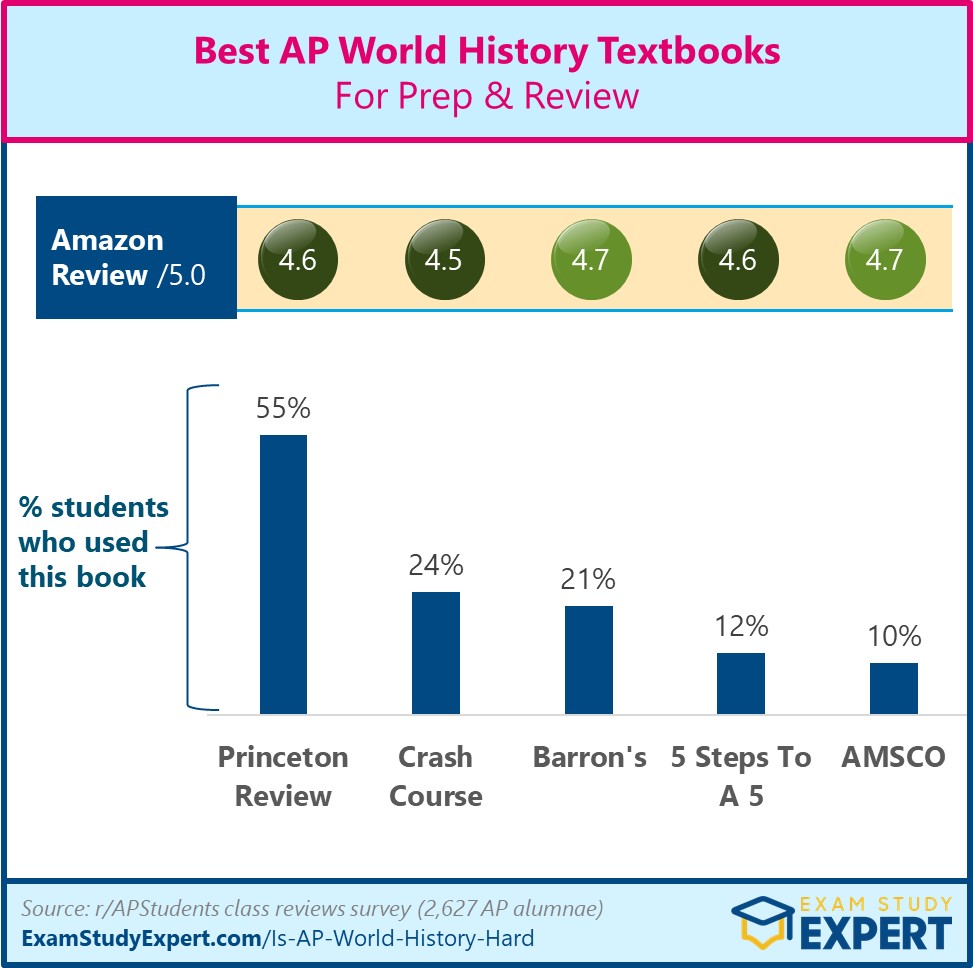
Other popular AP World History test prep / review books and resources for include:
Where next?
Find out how AP World History compares to other classes: click here for an overview of all AP Classes ranked by difficulty, from easiest to hardest.
Or check out how other history courses are rated with our analysis of AP US History (APUSH) and AP European History.
Wishing you every success in the class!
- [2024] Are AP US Government & Politics and AP Comparative Government and Politics Hard or Easy? Difficulty Rated ‘Quite Easy’ (Real Student Reviews + Pass Data) - 5 Jan 2024
- [2024] Is AP Human Geography Hard or Easy? Difficulty Rated ‘Quite Easy’ (Real Student Reviews + Pass Data) - 5 Jan 2024
- [2024] Is AP Microeconomics Hard or Easy? Difficulty Rated ‘Quite Easy’ (Real Student Reviews + Pass Data) - 5 Jan 2024

